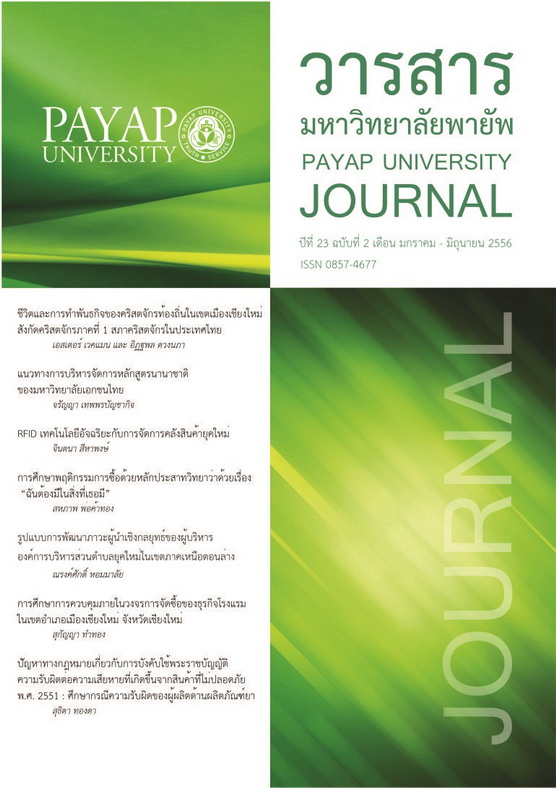รูปแบบการพัฒนาภาวะผู้นำเชิงกลยุทธ์ของผู้บริหารองค์การบริหารส่วนตำบลยุคใหม่ในเขตภาคเหนือตอนล่าง
Main Article Content
บทคัดย่อ
การวิจัยครั้งนี้มีวัตถุประสงค์เพื่อ 1) ศึกษาองค์ประกอบคุณลักษณะภาวะผู้นำเชิงกลยุทธ์ของผู้บริหารองค์การบริหารส่วนตำบลยุคใหม่ 2) เพื่อศึกษาวิธีการพัฒนาภาวะผู้นำเชิงกลยุทธ์ของผู้บริหารองค์การบริหารส่วนตำบลยุคใหม่ และ 3) เพื่อศึกษารูปแบบการพัฒนาภาวะผู้นำเชิงกลยุทธ์ของผู้บริหารองค์การบริหารส่วนตำบลยุคใหม่กลุ่มตัวอย่างที่ใช้ในการวิจัย คือผู้บริหารองค์การบริหารส่วนตำบลกลุ่มจังหวัดภาคเหนือตอนล่าง จำนวน 480 คน และกลุ่มผู้เชียวชาญทั้งหมด 15 คน สถิติที่ใช้ในการวิเคราะห์ข้อมูลได้แก่ การวิเคราะห์องค์ประกอบ (Factor Analysis) สถิติการบรรยาย (Descriptive Statistic) ผลการวิจัยพบว่า
1. องค์ประกอบภาวะผู้นำเชิงกลยุทธ์ของผู้บริหารองค์การบริหารส่วนตำบลยุคใหม่ มี 6 องค์ประกอบหลัก คือ ความสามารถในการคิดนอกกรอบ, ความสามารถในการเปลี่ยนแปลง, ความสามารถในการกำหนดเป้าหมาย, ความสามารถในการมีมนุษย์สัมพันธ์,ความสามารถในด้านการมีคุณธรรม และความสามารถในด้านการมีวิสัยทัศน์
2. วิธีการพัฒนาภาวะผู้นำเชิงกลยุทธ์ของผู้บริหารองค์การบริหารส่วนตำบลยุคใหม่ มีทั้งหมด 7 วิธี ประกอบด้วย การเรียนรู้ออนไลน์, การระดมความคิด, การสัมมนา,การประชุมเชิงวิชาการ, การศึกษาดูงาน, กิจกรรมนันทนาการ และการบรรยาย
3. การศึกษารูปแบบการพัฒนาภาวะผู้นำเชิงกลยุทธ์ของผู้บริหารองค์การบริหารส่วนตำบลยุคใหม่ มี 5 กระบวนการ คือ กระบวนการ “รูปแบบ L T S D E” ประกอบด้วย กระบวนการให้ “รู้” หรือ L (Learning), กระบวนการให้ “คิด” หรือ T (Thinking), กระบวนการให้ “ดู” หรือ S (Seeing), กระบวนการให้ “ทำ” หรือ D (Doing) และ กระบวนการ “ประเมินผล” หรือ E (Evaluation)
Article Details
เอกสารอ้างอิง
เนตร์พัณณา ยาวิราช. (2552). ภาวะผู้นําเชิงกลยุทธ์. กรุงเทพฯ: บริษัท เซ็นทรัลเอ็กซ์เพรส จํากัด.
ยุทธพงษ์ กัยวรรณ์. ( 2543), พื้นฐานการวิจัย. กรงุเทพฯ: สุวีริยาสาส์น.
รังสรรค์ ประเสริฐศรี. (2544). ภาวะผู้นํา. กรงุเทพฯ: ธนธัชการพิมพ์.
เรืองวิทย์ เกษสุวรรณ. (2556). การจัดการภาครัฐแนวใหม่. (พิมพ์ครั้งที่1). กรงุเทพฯ: บพธิการพิมพ์.
สุเทพ พงศ์ศรีวัฒน์. (2548). ภาวะผู้นํา ทฤษฎีและปฏิบัติ: ศาสตร์และศิลป์สู่ความเป็นผู้นําที่สมบูรณ์. (พิมพ์ครั้งที่ 2 ฉบับปรับปรุง). กรุงเทพฯ: วิรัตน์เอ็ดดูเคชั่น.
สุเทพ พงศ์ศรีวัฒน์. (2550). ภาวะความเป็นผู้นํา. กรุงเทพฯ: เอกซ์เปอร์เน็ท.
DuBrin, A. (1998). Leadership: Research Findings, Practice, and Skills. Boston: Houghton Mifflin.
Fulmer, Robert M. (2009). The strategic development of high potential leader. Strategy & Leadership, 37(3), 17-22
Hitt, M. A., Hoskisson, R. E., & Ireland, R. D. (2007). Management of strategy: Concept and cases. Mason, OH : Thomson South-Western.
Johnson, G. (2010). Strategic leadership development program at the university of York. Strategic HR Review, 9(4), 5-12.
Locke, A, Tarantino, A. (2006). Strategic leadership development D, 60 (12), 53 – 55.
Nahavandi, A. and Malekzadeh, A.R. (1993) “Leader Style in Strategy and Organizational Performance : A Integrative Framework.” Joumal of Management Studies, 30(3), 405 – 425.
Northouse, Peter Guy. (2010 ). Leadership: Theory and practice/Peter G. Northouse.-5th ed.p.cm.
www.ocsc.go.th/ocsc/th/index.php?option=com-content. (สืบค้นเมื่อวันที่ 18 ธันวาคม 2556).


